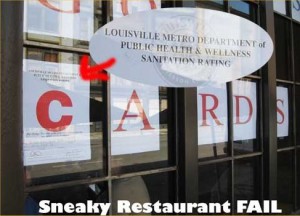“Bloody … with cheese.”
That’s how the burley, 50-ish goateed he-man requested his hamburger be cooked at a golf course in Baltimore in 2005.
 His sidekick piped up, “Me too.”
His sidekick piped up, “Me too.”
Our foursome of food safety types were alternately alarmed and amazed, but ultimately resigned to conclude that much of what passes for food safety advice falls on deaf ears.
I asked the kid flipping burgers if he had a meat thermometer.
He replied, snickering, “Yeah, this is a pretty high-tech operation.”
The young woman taking orders glanced about, and then confided that she didn’t think there was a meat thermometer anywhere in the kitchen; this, at a fancy golf course catering to weddings and other swanky functions.
Darcy Spears of KTNV in Nevada reports that the 19th Hole Supper Club in Mesquite got a 35 demerit C grade on its July 29 inspections. Due to poor inspection history their management was  told to schedule a supervisory conference with the Health District before they’re allowed to be reinspected.
told to schedule a supervisory conference with the Health District before they’re allowed to be reinspected.
Their violations were for things like expired food, improperly cooled gravy and fresh garlic in butter left sitting out at room temperature. Inspectors found multiple prepared foods in the walk-in fridge that were more than seven days old and they were using whipped cream that was more than a month expired.
When Chief Investigator Darcy Spears showed up asking for the person in charge, she was sent to a bartender who said the person in charge was Armando.
The bartender said Armando wouldn’t talk to us.
“What we got in trouble for not our fault,” explained the bartender.
“The stuff in the health report is not your fault?” asked Darcy.
“Well, the cooler was down and it had just gotten repaired. And they were moving stuff out of it but it didn’t matter,” said the bartender.
The health inspector did note that neither the fridge nor the salad prep area were holding a safe temperature.
“I do know there was stuff like month old whipped cream and that is not a broken cooler when you’re serving month old whipped cream at least according to the health report that was happening. Improper hand washing,” explained Darcy.
“I don’t know nothing about any of that,” said the bartender.
Todd Peterson owns the 19th Hole. He sent a written statement saying his restaurant has been providing good and safe food for over 18 years. Most of the issues were corrected while the Health District was on the property. The rest have since been corrected and he said they’re positive their good rating will be returned.
 Hannah Knowles of the Sacramento Bee reports authorities closed all of Lake Wildwood’s public beaches last week after water testing confirmed reports linking E. coli infections to the lake’s Main Beach, also called Commodore Park. The county also advised against any swimming in the lake.
Hannah Knowles of the Sacramento Bee reports authorities closed all of Lake Wildwood’s public beaches last week after water testing confirmed reports linking E. coli infections to the lake’s Main Beach, also called Commodore Park. The county also advised against any swimming in the lake.








